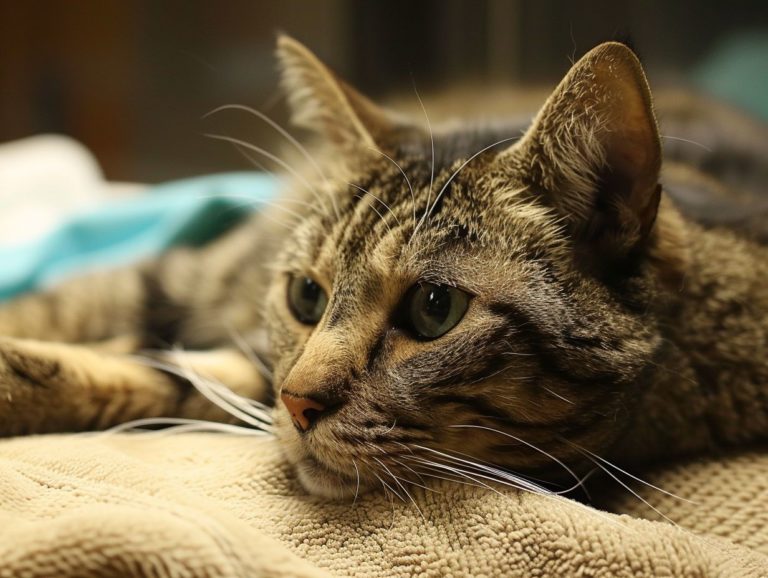Understanding The Fine Print Of Senior Cat Insurance Policies
This article will cover the importance of senior cat insurance, common health issues in older cats, and key factors to consider when selecting senior cat insurance.
It will also explore coverage options, limitations, costs, and premiums, offering guidance on understanding the details of senior cat insurance policies.
By reading this article, you will gain confidence in choosing the most suitable policy for your senior cat.
Key Takeaways:
What is Senior Cat Insurance?
Senior Cat Insurance provides coverage for older cats, offering medical care for aging feline pets without imposing a high financial burden on owners. This insurance option includes various types of coverage, with some plans reimbursing a percentage of vet bills, covering medication costs, and including preventive care services.
The cost of insuring older cats with Senior Cat Insurance can vary significantly based on factors such as the pet’s age, breed, and current health status. Premiums for senior cat insurance are typically determined by similar factors as other pet insurance plans, such as coverage limits, reimbursement percentage, and chosen deductible amount.
Due to their age and increased health risks, senior cats are usually more costly to insure compared to younger cats. However, by opting for senior cat insurance, pet owners can ensure that they can provide the best care for their aging feline companion.
Why Senior Cats May Need Insurance
Senior cats may require insurance due to the increasing likelihood of age-related illnesses that necessitate expensive and ongoing treatment. With advancing age, cats are more prone to conditions like arthritis, kidney disease, and dental problems. These age-related ailments demand regular veterinary visits and medical interventions to uphold their health and quality of life.
Common Health Issues in Senior Cats
Common health issues in senior cats, such as arthritis, diabetes, hyperthyroidism, and dental disease, have the potential to greatly affect the quality of their lives. Regular visits to a reliable veterinarian are essential to effectively monitor and control these age-related afflictions.
As cats age, they have a higher likelihood of developing chronic issues that require long-term management. Arthritis is one of the most common problems seen in older cats, leading to pain and loss of mobility, necessitating the pet owner to seek help from their veterinarian to manage pain and treat the underlying condition.
Diabetes and hyperthyroidism can significantly impact the overall health of a senior cat, requiring special diets, medication, and care to keep these conditions under control. Dental disease is another common concern that can result in pain, infections, and eating issues, emphasizing the importance of regular dental check-ups and cleanings for older cats.
Important Factors to Consider When Choosing a Policy
When considering Senior Cat Insurance, it is important to understand the key elements such as the deductible amount, wellness care coverage, and the specific inclusions and exclusions of the policy. Ensure that these key elements are included in the policy and comprehend how they impact the coverage for senior cats.
Coverage Options and Limitations
Senior Cat Insurance policies offer coverage options for accident and illness, wellness care, dental, and other specific needs of older cats. It is important for pet owners to review policy limitations set by insurers to ensure adequate coverage.
By understanding these limitations, pet owners can make informed decisions about the level of coverage required for their senior cats. Insurers outline the policy’s inclusions and exclusions, which determine the scope of benefits and potential claim scenarios.
Comprehensive coverage provides protection for senior cats against unforeseen medical expenses, offering pet parents peace of mind knowing their cats will receive proper care when needed.
Costs and Premiums
The costs and premiums of Senior Cat Insurance are influenced by factors such as the age of the cat, breed-specific risks, and the types of coverage chosen by pet owners. To manage their financial obligations effectively, pet owners have the option to select plans with varying reimbursement rates and deductible levels.
It is important to consider that premiums for senior cats may increase with age due to heightened healthcare needs. Additionally, the presence of pre-existing conditions and the geographic location of the pet owner can impact insurance costs. Reimbursement is typically based on a submitted claim along with relevant veterinary records, which the insurance company will assess before reimbursing eligible expenses. For more information, check out the legal aspects of insuring your senior cat.
When searching for insurance for senior cats, pet owners should compare different insurance plans to find the best value, taking into account the extent of coverage and any exclusions that could affect overall affordability.
Navigating the Fine Print of Senior Cat Insurance Policies
Senior Cat Insurance policies provide information on policy inclusions and exclusions, the range of coverage options from various insurers, and the specific terms and conditions that may impact the coverage. Pet owners can make informed decisions after reviewing these details.
Understanding Key Terms and Clauses
Understanding key terms and clauses of Senior Cat Insurance, such as deductibles, waiting periods, and requirements for pre-existing condition coverage, helps pet owners make informed decisions and ensures that their senior cats receive the necessary care without unexpected issues.
Deductibles refer to the amount of money that the pet owner must pay out of their own pocket before the insurance coverage takes effect. Waiting periods indicate the time between purchasing the policy and when the coverage commences.
Some Senior Cat Insurance policies may have examination requirements, meaning that a veterinarian needs to conduct a health status examination of the cat to determine eligibility for coverage. Pet owners can better navigate the process of insuring their senior cats by understanding these elements.
Tips for Finding the Right Policy for Your Senior Cat
When choosing the best pet insurance for senior cats, it is important to compare the available insurers, evaluate the types of coverage they offer, and assess how different policies align with your senior cat’s specific treatment requirements. Seeking advice and insights from industry experts and veterinarians can also be valuable in making an informed decision.
Researching and Comparing Options
When researching the best Senior Cat Insurance options, it is important for owners to compare them to find a policy that suits the age, medical history, and specific care needs of their senior cat. By comparing multiple plans and providers, pet owners can make informed decisions about their pet’s health coverage. Understanding the unique health challenges faced by older cats is crucial when selecting the best insurance. Considerations such as pre-existing conditions, potential age-related medical issues, and required medications should be taken into account. This guide aims to assist in determining the factors to consider and the types of insurance to seek when covering a senior cat.
For all senior cats, consider a policy that covers routine veterinary care, emergency services, or both. As cats age, they are more prone to chronic illnesses, making regular vet check-ups essential for early detection and potential cost reduction of care. Insuring your senior cat for routine veterinary care, which includes preventative and follow-up care like dental cleanings, vaccinations, and check-ups, can be advantageous. Emergency services coverage is vital for sudden, life-threatening illnesses, especially in older cats, to ensure they receive necessary care without financial concerns. Check out the essential guide to senior cat insurance for what you need to know.
When evaluating insurance options for emergency or routine care, look for policies with low premiums, deductibles, and co-payments. Premium refers to the amount paid monthly or annually for insurance coverage, and finding a policy with a low premium is important, although it may come with high deductibles. Deductible is the out-of-pocket amount before the insurance kicks in, with policies having high deductibles usually offering lower premiums. Co-payment, or coinsurance, is the percentage of the vet bill covered by the insurance company, affecting the out-of-pocket expenses. Lower co-payments typically mean higher premiums and vice versa.
It is crucial to review limitations and exclusions in your cat’s insurance policy, especially regarding senior cats. Common limitations include coverage caps, specific diagnosis exclusions, and breed-specific exclusions, with some policies having yearly or lifetime coverage limits. Understanding these limitations is essential to ensure adequate coverage for your cat’s needs. When comparing insurance policies, consider your senior cat’s breed, age, and any pre-existing conditions to make an informed decision.
Consulting with Your Veterinarian
Consulting with a veterinarian is a crucial factor in determining the best Senior Cat Insurance, as veterinarians can offer guidance on selecting insurance tailored to a cat’s current health status, potential illnesses, and medical examination requirements.
Veterinarians play a key role in assisting pet owners with choosing insurance that suits their pet’s needs, drawing on their expertise in the unique healthcare requirements of aging cats. They can recommend insurance plans that address age-related conditions and advise on preventive measures to support the health of senior cat insurance.
Regular check-ups and screenings are essential for early detection of health issues, and veterinarians can suggest insurance options that cover these services. By consulting with a veterinarian, pet owners can ensure that their senior cats have access to the necessary medical care and support through a suitable insurance policy.
Frequently Asked Questions
What is considered a senior cat for insurance purposes?
In general, cats over the age of 8 are considered seniors for insurance purposes. However, this may vary between insurance companies, so it’s best to check with your specific policy.
What does the “fine print” of a senior cat insurance policy refer to?
The fine print refers to the specific details and terms of the insurance policy that may not be as prominently advertised. This includes things like deductibles, coverage limits, and exclusions.
Do senior cats require different insurance coverage than younger cats?
Yes, most insurance companies offer different policies specifically for senior cats. These policies may have higher premiums due to the increased risk of health issues in older cats.
What are some common exclusions in senior cat insurance policies?
Some common exclusions in senior cat insurance policies include pre-existing conditions, hereditary conditions, and certain breeds or species. It’s important to carefully review the exclusions before purchasing a policy.
Is there a waiting period for coverage to begin on a senior cat insurance policy?
Yes, most insurance companies have a waiting period of 14-30 days before coverage for a senior cat policy begins. This allows the insurance company to assess the health of the cat and ensure there are no pre-existing conditions.
Can I switch insurance policies for my senior cat?
Yes, you can switch insurance policies for your senior cat at any time. However, it’s important to carefully review the terms and details of the new policy to ensure it meets your needs and covers any pre-existing conditions.

